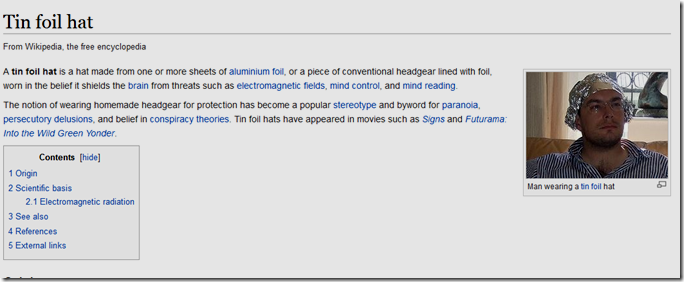
A regular reader forwarded the following post to me, regarding our go-to source for misinformation: Wikipedia.
Writing in The Daily Dot, E.J. Dickson describes surprise in discovering that a 2009 edit made to a Wikipedia entry as a college prank had spread all over the world.
Dickson explains:
“we were stoned out of our minds” and had just come from the McDonald’s drive-thru to get chicken selects when we decided to edit Wikipedia pages for various semi-obscure children’s book authors. (I think we also did one for R.L. Stine, but Evan says no.)
It was total bullshit: We knew nothing about Amelia Bedelia or the author of the series, Peggy Parish, let alone that she’d been a maid in Cameroon or collected many hats. It was the kind of ridiculous, vaguely humorous prank stoned college students pull, without any expectation that anyone would ever take it seriously. “I feel like we sort of did it with the intention of seeing how fast it would take to get it taken down” by Wikipedia’s legion of editors, Evan says.
Dickson writes:
The “Amelia Bedelia was a maid in Cameroon” factoid had been cited in a lesson plan by a Taiwanese English professor. It was cited in a book about Jews and Jesus. It was cited in innumerable blog posts and book reports, as well as a piece by blogger Hanny Hernandez, who speculated that Amelia Bedelia’s tendency toward malapropisms was inspired by Parish’s experiences in Cameroon, as “several messages can be misinterpreted between a Cameroonian maid who is serving an American family.”
One blogger even speculated that Amelia Bedelia wasn’t a maid, but a slave. It was cited in the Amelia Bedelia entry on the website TV Tropes and Idioms, and Peggy Parish’s Find-A-Grave page. It was even cited by Mr. Amelia Bedelia himself: Herman Parish, Peggy’s nephew and author of the books after his aunt passed away in 1988, who apparently told a reporter from the Waterloo-Cedar Falls Courier that his aunt based “the lead character on a French colonial maid in Cameroon.”
As longtime readers will recall, I have written at length about the problems with Wikipedia, and Google’s insistence on “white-listing” it as a source that can do no wrong.

One of my favorite Wikipedia entries: The Tin Foil Hat.
Previously on the L.A. Daily Mirror:
Wikipedia, Murder and Myth — about the death of Ted Healy as covered in Wikipedia.


I use Wikipedia constantly – and am a contributor of money, if not data. In the surely, billions, if not trillions of pieces of Wiki data published, no doubt there is a miniscule percentage of errors and hoaxes,. I also read the LA. Times on a daily basis and I can’t begin to count the quantity of errors of commission, omission and downright foolishness I encounter in its pages EVERY DAY! And that goes al well for The New York Times, TIME Magazine, The New Yorker and every other periodical I regularly read except the National Geographic and Smithsonian magazines, and that;s only because I’m too dumb to challenge them. So what is your big problem with Wikipedia? My instinct tells me it’s something personal. Fess up, Larry. Truth wants to know,
LikeLike
Let me put together an answer for you.
LikeLike
There’s really no comparison. Every magazine and newspaper story carries the byline of the reporter or sometimes multiple reporters. Not anyone can write for the New York Times, the New Yorker or the Los Angeles Times. In contrast, anyone can write or edit Wikipedia — even a stoned college student, as occurred in this article.
If there is an error in a newspaper or magazine story, it is corrected in a subsequent issue, in the electronic archives and online. And the correction remains permanently affixed.
With Wikipedia, an error can be removed and restored almost infinitely in what sometimes become “revert wars.”
A newspaper or magazine story may present original research and often does.
Wikipedia prohibits original research. Every statement is supposed to be sourced, but citations are often lacking.
My quarrel with Wikipedia is that it is a sinkhole of mistakes, urban legends and folklore that may be written by anyone with a pulse and passes for a credible source, particularly for Google searches. It is useful for pop culture — as in the lengthy biography of “South Park’s” Eric Cartman — but as we have seen again and again, it cannot be trusted in more serious subjects.
LikeLike
Appalling. It’s astonishing how quickly misinformation is believed.
LikeLike
College pranks have really gone to the dark side since I engaged in them.
LikeLike
Larry is so right here, I see people posting things about silent film people or LA-related buildings they pulled off Wikipedia, and half of it isn’t true. You have to write in to correct these people’s mistakes as to the slanderous lies and scandal they post about people, and the wrong dates, architects, and histories of buildings easily found if they would just search LA Times in Proquest, Library of Congress Public Domain newspaper site, Media History Digital Library, or Variety Archives. Eve Golden has pointed out that she’s given up correctly the many mistakes and boneheaded comments on Wikipedia on people she’s written biographies of. I sometimes think people would rather believe colorful, dirty lies made up by people like Kenneth Anger than really know the real history of something.
LikeLike